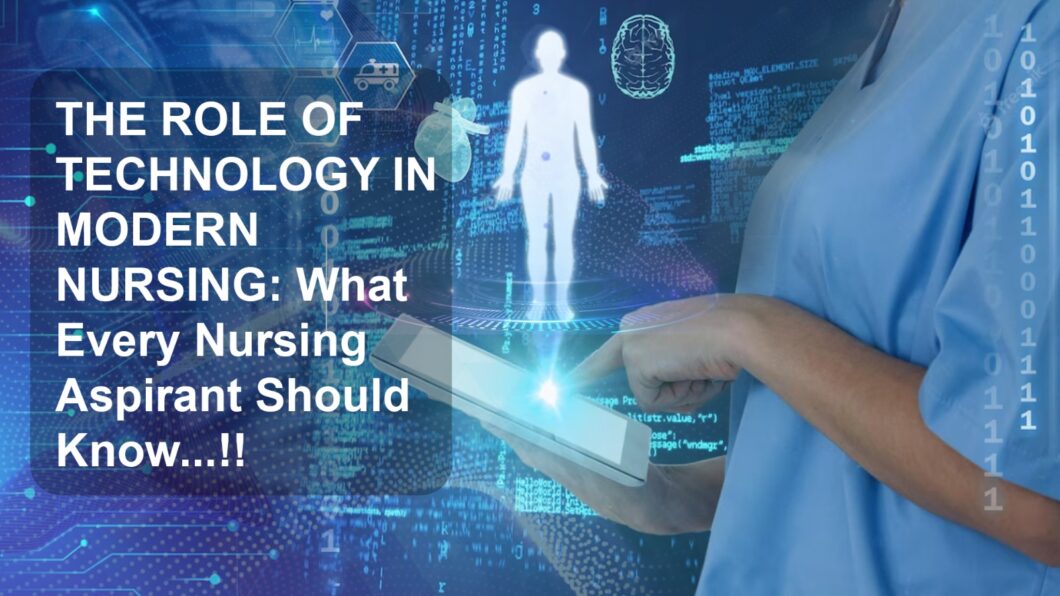In today’s rapidly evolving healthcare landscape, the role of technology in modern nursing is more significant than ever before. Aspiring nurses, whether pursuing a GNM (General Nursing and Midwifery) course, a B.Sc. in Nursing, or Assistant Nursing Course, must understand the profound impact that technology has on their future profession. This article explores how technology is shaping the field of nursing education and practice, equipping nurses with the tools they need to provide high-quality care in the 21st century.
The Evolution of Nursing Education
In the past, nursing education primarily relied on textbooks, lectures, and hands-on clinical experience. However, the digital age has transformed the way nursing students learn. Today, nursing education integrates various technologies to enhance the learning experience. Nursing education has shifted from traditional methods to modern approaches.
E-learning, online resources, and simulation technology has enhanced learning.
Technology has improved the quality of education and prepares students for real-world scenarios.
Electronic Health Records (EHRs):
One of the most significant advancements in nursing technology is the adoption of Electronic Health Records (EHRs). EHRs have revolutionized patient care and documentation, making it more efficient and accurate.
EHRs enhances patient safety and care continuity. Nurses must also be equally equipped to meet the needs to effectively use EHR systems.
Telemedicine and telehealth technologies have expanded nursing capabilities beyond traditional settings.
Nurses can now provide virtual care and support through telehealth which also gives rise to the necessity of proficiency in communication skills that prove to be crucial for telehealth nursing. Aspiring Nurses should also be aware of the new developments in the healthcare sector.
Robotics and Automation in Nursing:
Advancements in robotics and automation are changing the way nurses deliver care. Understanding these technologies is essential for nursing aspirants to stay competitive in the job market.
Surgical robots are revolutionizing the field of surgery. They are used in minimally invasive procedures, such as laparoscopic and robotic-assisted surgeries which enhances precision, dexterity, and control over surgical instruments. For nursing aspirants, understanding how surgical robots work and their applications is crucial, as nurses often play a vital role in assisting during surgical procedures. Robots are increasingly being employed to support patient care in hospitals and long-term care facilities. These robots can assist with tasks like patient transportation, medication delivery, and monitoring vital signs. Nursing students should be aware of these technologies as they may interact with them during clinical rotations and in future practice.
Electronic Medication Administration Records (eMAR) systems are electronic records used to document medication administration. They help nurses verify medication orders, record administrations, and track patient responses. Understanding and using eMAR systems efficiently is a critical skill for nursing students and practicing nurses alike to ensure patient safety.
The Need for Continuous Professional Development in Nursing:
Nursing is a dynamic field with constantly evolving technology, treatments, and healthcare practices. To stay effective and up-to-date, nurses must engage in continuous professional development (CPD). This involves actively seeking opportunities to learn and grow in their profession throughout their careers.
CPD helps nurses acquire new skills, stay current with best practices, and adapt to changes in healthcare policies and technology. It can involve formal education, attending conferences, workshops, and even self-directed learning through online resources and journals.
Emphasize that nursing aspirants should be prepared for a lifelong commitment to learning and self-improvement to excel in their careers.
Resources and Organizations that Support Nurses in Staying Tech-Savvy:
Many resources and organizations are dedicated to helping nurses stay updated with the latest advancements.
Healthcare and Nursing institutions like Rudram Foundation and MedStudies often offer in-house training and workshops to ensure that nursing staff is proficient in using technology and electronic health records.
The Potential for Technology to Enhance Job Satisfaction and Work-Life Balance:
Technology has the potential to improve job satisfaction and work-life balance for nurses in several ways. Electronic health records (EHRs) and digital documentation systems can streamline administrative tasks, reducing paperwork and allowing more time for patient care.
Telehealth and remote monitoring technologies enable nurses to work remotely or from home, offering greater flexibility and potentially reducing commute times and stress.
Enhanced communication tools and mobile apps can improve collaboration among healthcare teams, making it easier for nurses to consult with colleagues and access information quickly.
In conclusion, the role of technology in modern nursing is transformative and dynamic. Nursing aspirants, whether pursuing a GNM, B.Sc. in Nursing, or Assistant Nursing Course, should embrace technology as an integral part of their future profession. By staying informed and adaptable, nurses can harness the power of technology to provide safer, more efficient, and patient-centered care in the 21st century healthcare landscape. As technology continues to advance, so too will the opportunities and responsibilities


